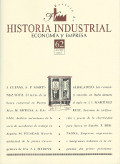The «consorzi vinicoli» in Italy during the twentieth century: a model of success co-operative enterprise
Keywords:
Wine sector, co-operative wineries, Italy, twentieth centuryAbstract
Co-operative wineries in the traditional wine-producing countries of the Mediterranean Europe show similar features from a historical point of view. These entities are a key factor to understand the evolution of the wine sector in the major producing region of the world. In this context, the case Italy is outstanding. In that country co-operative wineries have experienced greater business success. That contradicts to a part of economic theory that considers that this business model is less efficient than capitalist and it is useful only in times of crisis. The main target of this work is to establish what were the causes of Italian co-operative wineries are a case of business success. We consider the key factor of this differential fact was the presence of “umbrella organizations”. They helped to structuring and developing the sector to improve their competitiveness through the formation of large co-operative consortia of second and third degree (consorzi vinicoli).Downloads
Downloads
Published
How to Cite
Issue
Section
License
We have been applying a Creative Commons Attribution license (CC-BY) since 2019, before that year we had a partial open access policy, which included open access for the first two months after publication, followed by an embargo policy for non-subscribers, as access to the last 4 published issues was restricted to journal subscribers. In contrast, early-view articles were always open access prior to publication in an assigned volume. Until 2024 the access to the last 4 published numbers was restricted to those who were subscripted to the journal.
The author assigns all rights to the publisher. Creative Commons
The author who publishes in this journal agrees to the following terms:
- The author assigns all intellectual property rights exclusively to the publisher for the entire duration of the applicable intellectual property rights.
- The publisher will distribute the texts under the Creative Commons Attribution License, which allows others to share the work, provided that they acknowledge the authorship, its initial publication in this journal, and the conditions of the license.





